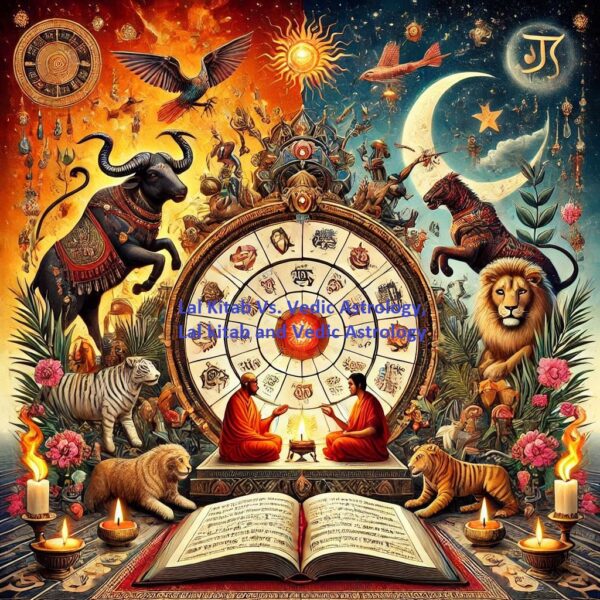Lal Kitab Vs. Vedic Astrology, Lal kitab and Vedic Astrology
 Lal Kitab and Vedic Astrology are two distinct systems of astrology that originate from Indian traditions, each with its own methodologies, philosophies, and applications.
Lal Kitab and Vedic Astrology are two distinct systems of astrology that originate from Indian traditions, each with its own methodologies, philosophies, and applications.
Key Differences
1. Origin and Historical Context:
- Lal Kitab: This system emerged in the 18th century, attributed to Pandit Giridhar Lal Sharma. It is known for its simplicity and practical remedies, integrating elements of palmistry along with astrology. The text is less extensive than Vedic astrology, focusing primarily on straightforward guidance rather than complex calculations.
- Vedic Astrology: Rooted in ancient Vedic scriptures, this system is much older, tracing back thousands of years. It involves extensive literature written by sages and emphasizes mathematical calculations and detailed astrological charts (Kundli) based on a person’s birth details.
2. Methodology:
- Lal Kitab: Unlike Vedic astrology, Lal Kitab does not prioritize the Lagna (ascendant) or Rashi (zodiac sign) in its predictions. Instead, it focuses on the positions of planets within houses and provides remedies aimed at mitigating negative influences. Its approach is seen as more accessible to the general public.
- Vedic Astrology: This system places significant importance on the Lagna and uses a complex framework of planetary positions within a 12-sign zodiac belt. Predictions are made based on detailed Kundli analysis and involve intricate calculations.
3. Predictive Focus:
- Lal Kitab: It is primarily result-oriented, offering remedies that are believed to provide quick solutions to life’s challenges. The predictions are often easier to interpret but may lack the depth found in Vedic astrology.
- Vedic Astrology: This approach is more comprehensive, analyzing various factors such as planetary transits, aspects, and Dasha (planetary periods) to predict future events. It aims for a deeper understanding of an individual’s life path and karmic influences.
Similarities: Despite their differences, both systems share common goals:
- Both aim to provide insights into an individual’s life and offer remedies for overcoming obstacles.
- They draw from ancient Indian wisdom and have dedicated followings around the world.
Lal Kitab offers a simpler, more practical approach to astrology with an emphasis on remedies, Vedic Astrology provides a complex framework rooted in ancient texts that requires deeper study and mathematical precision. Each system has its unique strengths, catering to different preferences among practitioners and seekers of astrological guidance.
Lal Kitab vs. Vedic Astrology: A Comparative Overview
Both Lal Kitab and Vedic Astrology are prominent systems of astrological analysis that offer guidance on life’s various aspects. However, they differ significantly in their origins, methodology, and application. Here’s a detailed comparison:
1. Origins and Philosophy
- Lal Kitab:
- Originates from a series of five Urdu-language books written in the mid-20th century by Pandit Roop Chand Joshi.
- It combines astrological concepts with practical, remedial solutions rooted in palmistry and Indian mysticism.
- Focuses heavily on remedies and pragmatic approaches to mitigate planetary effects.
- Vedic Astrology:
- Ancient system derived from the Vedas, particularly the Rigveda and later classical texts like Brihat Parashara Hora Shastra.
- Based on the concept of karma and its effects as reflected through planetary movements and placements.
- Emphasizes predictive astrology, spiritual growth, and understanding one’s dharma (life purpose).
2. Charts and Calculations
- Lal Kitab:
- Uses a simplified horoscope system, often following a fixed format of chart placement (e.g., Aries is always the first house).
- Less emphasis on exact degrees and technical intricacies.
- Relies on practical analysis of houses and planetary combinations without considering divisional charts or Nakshatras.
- Vedic Astrology:
- Based on precise calculations using planetary degrees, divisional charts (e.g., Navamsa), and Nakshatras (lunar mansions).
- Employs tools like Dasha systems, Ashtakavarga, and transits to provide in-depth analysis.
3. Remedies
- Lal Kitab:
- Focuses on easy-to-follow remedies (often referred to as “Tote” or tricks) like feeding birds, wearing specific colors, or placing objects in a specific location at home.
- Remedies are practical and accessible, designed to offset malefic planetary influences.
- Vedic Astrology:
- Remedies often include mantras, yantras, pujas (rituals), gemstone recommendations, and observing fasts.
- Focuses on spiritual and ritualistic practices tied to karmic cleansing.
4. Spiritual vs. Practical Orientation
- Lal Kitab:
- Strongly practical, addressing immediate and material concerns (health, wealth, relationships, etc.).
- Theoretical aspects of astrology are secondary to its remedial focus.
- Vedic Astrology:
- Deeply rooted in spiritual philosophy, offering insights into one’s higher purpose, past-life karma, and soul evolution.
- Remedies often include practices for inner transformation and spiritual growth.
5. Accessibility
- Lal Kitab:
- Known for being simpler and more accessible to laypersons.
- Does not require extensive knowledge of astrological technicalities.
- Vedic Astrology:
- Highly technical and complex, requiring years of study and understanding of Sanskrit texts.
- Advanced analysis often demands detailed chart readings.
6. Applications
- Lal Kitab:
- Ideal for those seeking quick, actionable solutions for life challenges.
- Popular in regions where practical astrology is prioritized.
- Vedic Astrology:
- Preferred by those interested in detailed, comprehensive predictions and insights into their spiritual and karmic paths.
Similarities: Despite their differences, both systems aim to:
- Understand human life and destiny through planetary influences.
- Provide guidance and solutions to alleviate challenges.
- Enhance the quality of life by harmonizing planetary energies.
Lal Kitab is a practical, remedial-oriented system suitable for quick fixes, while Vedic Astrology offers a deep, spiritually enriching framework for understanding life and karma. Both have their unique strengths and are often complementary rather than contradictory.
Lal Kitab and Vedic Astrology are two distinct yet interconnected branches of astrology. Let’s explore their differences and similarities:
Vedic Astrology
- Origin: Ancient India, dating back thousands of years.
- Principles: Based on the sidereal zodiac, incorporating complex calculations and planetary positions.
- Predictions: Provides insights into various aspects of life, including career, relationships, health, and spirituality.
- Remedies: Often involve religious rituals, mantras, gemstones, and specific diets.
Lal Kitab
- Origin: 20th century, India.
- Principles: Derived from Vedic astrology but with a simpler approach, incorporating elements of palmistry and numerology.
- Predictions: Focuses on practical matters like health, wealth, and relationships.
- Remedies: Emphasizes simple and affordable remedies like charity, specific food items, and color-based rituals.
Similarities:
- Both systems use the birth chart (horoscope) to analyze an individual’s life.
- Both recognize the influence of planets and their positions on human life.
- Both offer guidance and solutions to various problems.
Differences:
- Complexity: Vedic astrology is more complex, involving intricate calculations and interpretations. Lal Kitab is relatively simpler and more accessible.
- Remedies: Vedic remedies can be elaborate and time-consuming, while Lal Kitab remedies are often quick and easy to perform.
- Focus: Vedic astrology provides a broader perspective on life, while Lal Kitab focuses on practical matters and immediate solutions.
Which one is better?
The choice between Lal Kitab and Vedic astrology depends on individual preferences and needs. Some people prefer the depth and complexity of Vedic astrology, while others find the simplicity and practicality of Lal Kitab more appealing.
Ultimately, the effectiveness of any astrological system depends on the knowledge and skill of the astrologer interpreting it. Both Lal Kitab and Vedic astrology can provide valuable insights and guidance, but it’s important to consult a qualified astrologer to get accurate predictions and effective remedies.
